House Bill 1214, sponsored by Rep. Lee Yancey, would repeal Certificate of Need laws in Mississippi. CON laws work to stifle competition, limit choice, and raise the cost of healthcare for consumers.
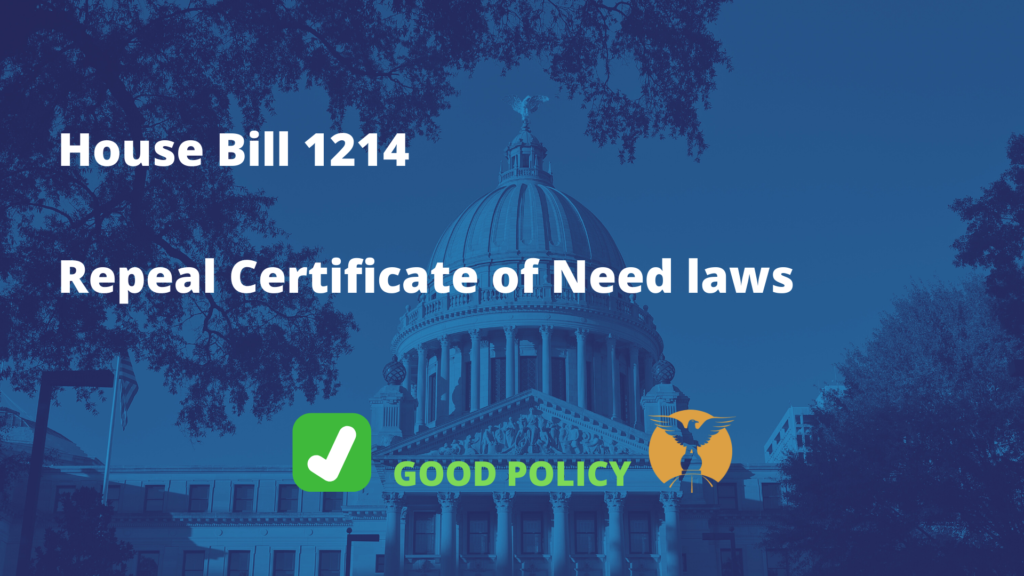
CON laws require would-be medical providers to prove — essentially to their competitors — that their community needs a new facility or service. The equivalent in the computer business would be a law prohibiting a startup (i.e., Apple) from entering the market without permission from IBM. Such a law would have prevented Apple from ever getting off the ground, making the iPhone revolution very unlikely. Just as competition in the computer industry has helped billions of consumers worldwide, repealing CON laws will increase the quality of healthcare for millions of Mississippians.
CON laws are a relic of a short-lived federal mandate that was repealed in 1986. After an initial push in the states to roll back these laws, lawmakers have been reluctant to challenge hospital monopolies. Rising healthcare prices, as well as rapid advances in technology, are encouraging state lawmakers to realize that CONs are harmful. In 2019, Florida repealed its CON law for hospitals and tertiary services. Likewise, Georgia recently reformed its CON laws.
Fifteen states currently have no CON laws. Both the Trump and Obama administrations have strongly urged states to repeal CON laws.
The Mississippi Department of Health is the central planner tasked with administering the state’s CON program. The Department’s CON Review program applies to “the establishment of new healthcare facilities, the offering of defined new institutional health services, and the acquisition of major medical equipment.” Some of the covered services include: Open heart surgery, in-patient rehabilitation services, chemical dependency services, radiation therapy services, diagnostic imaging, nursing home care, home health services, ambulatory surgical services, and long-term care hospital services. In some cases, such as for skilled nursing facilities, no CONs are being issued at all due to prohibitions enacted in the early 1980s.
Recent studies by economist Thomas Stratmann demonstrate that non-CON states have more hospital beds per capita, more rural hospitals, and more access to MRI machines. Stratmann also found that healthcare providers in CON-law states “tend to provide lower-quality services” and that “deaths from treatable complications following surgery and mortality rates from heart failure, pneumonia, and heart attacks are all significantly higher among hospitals in CON states than in non-CON states.”
Far from improving healthcare outcomes for the poor, as some claim, CON laws actually have a disproportionate impact on low-income consumers. They also correlate with negative healthcare outcomes for minorities. Researchers have found no evidence that CON laws result in more uncompensated/charity care — a supposed benefit derived from protecting hospital monopolies in low-income and rural areas.
This bill would require a three/fifths vote for passage.
MCPP has reviewed this legislation and finds that it is aligned with our principles and therefore should be supported.
Read HB 1214.
Track the status of this bill and all bills in our legislative tracker.
Senate Bill 2552, sponsored by Sen. Briggs Hopson, would remove the prohibition on how much alcohol a craft brewery can sell on its premises.
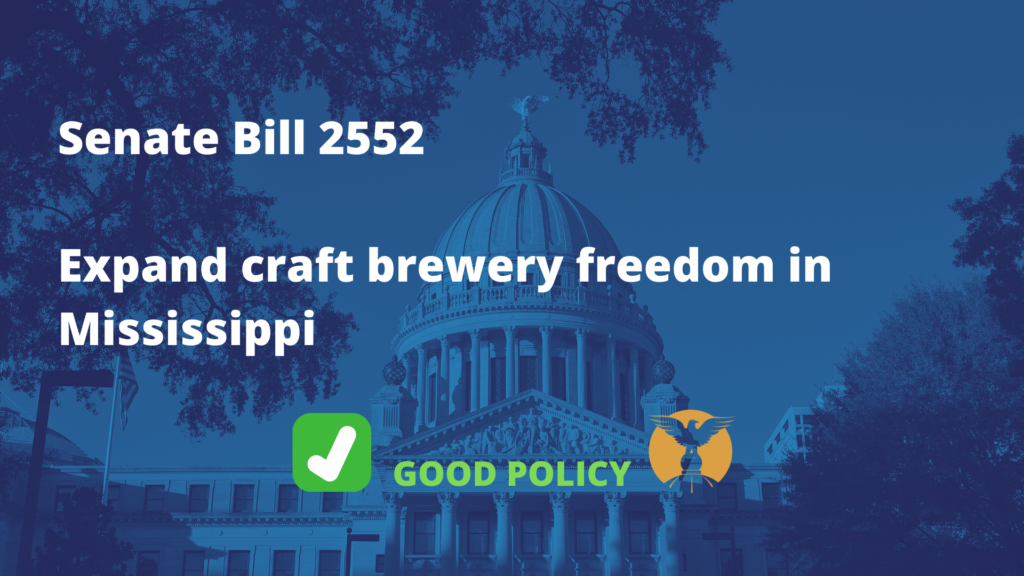
Currently, breweries cannot sell more than 10 percent of what they produced at their own place of business each year. The law essentially limits what a business is allowed to sell. But this was actually a step forward from the prior law that prohibited breweries from selling directly to consumers.
Still, the laws are limiting for consumers, and the state’s economy. Mississippi ranks last in terms of craft beer production. While the industry operates with $650 of economic production per capita in Vermont, it only produces $150 per capita in the Magnolia State.
We can grow the economy by removing regulations and barriers that prevent growth and opportunity. Eliminating this arbitrary cap would be a step in the right direction, and would help the state become a larger player in this growing industry.
MCPP has reviewed this legislation and finds that it is aligned with our principles and therefore should be supported.
Read SB 2552.
Track the status of this bill and all bills in our legislative tracker.
The former police chief of a north Mississippi town that receives a large percentage of its income from fines and forfeitures was arrested Wednesday on charges of embezzlement.
The state auditor’s office announced Wednesday that its agents arrested the former police chief of Walls, Herb Brewer for embezzlement.
Brewer was indicted by a grand jury convened by DeSoto County District Attorney John Champion.
Brewer was accused of embezzling $1,850 by selling vehicles seized by the police department and pocketing the proceeds. According to the auditor’s office, he allegedly sold a Ford Mustang and a Chevrolet Tahoe to members of his own family.
He was issued a demand letter for $6,943 at the time of his arrest, which includes interest and investigative costs. Investigators found that Brewer sold the vehicles for less than they were worth and this was also added to the demand letter.
If convicted, he faces $5,000 in fines and a five-year prison sentence.
Walls is a town of (1,379 population) in Desoto County and was ranked first in a recent study by Governing magazine which rank cities and towns nationwide on the amount of their budgets coming from fines and forfeitures.
An analysis of data from the Mississippi Center for Public Policy found that the town ranked second to State Line in terms of per capita income from fines and forfeitures.
Walls ranked second with 26.53 percent of its general fund budget from fines and forfeitures in 2017. It was 19.5 percent for all revenues, including the utility fund.
Except for one outlier in 2006, when fines and forfeitures made up 19.32 percent of the city’s budget, the percentage of city revenues dependent on fines and forfeitures was in single digits.
In 2013, the percentage of the city’s revenues ($941,915) sourced from fines and forfeitures ($152,788) crossed the 15 percent threshold and hasn’t gone lower since.
Fines and forfeitures in Walls, Mississippi
| Year | Total revenue | Fines and forfeitures | % of total revenues |
| 2006 | $ 321,273 | $ 62,058 | 19.32% |
| 2007 | $ 567,846 | $ 45,207 | 7.96% |
| 2008 | $ 716,032 | $ 34,056 | 4.76% |
| 2009 | $ 591,224 | $ 24,676 | 4.17% |
| 2010 | $ 611,919 | $ 19,036 | 3.11% |
| 2011 | $ 674,900 | $ 30,589 | 4.53% |
| 2012 | $ 867,161 | $ 67,301 | 7.76% |
| 2013 | $ 941,915 | $ 152,788 | 16.22% |
| 2014 | $ 1,071,620 | $ 234,113 | 21.85% |
| 2015 | $ 1,082,216 | $ 186,136 | 17.20% |
| 2017 | $ 1,220,332 | $ 238,476 | 19.54% |
Senate Bill 2531, sponsored by Sen. Walter Michel, and House Bill 981, sponsored by Rep. Brent Powell, would allow the sale of wine in grocery stores in wet counties or municipalities.
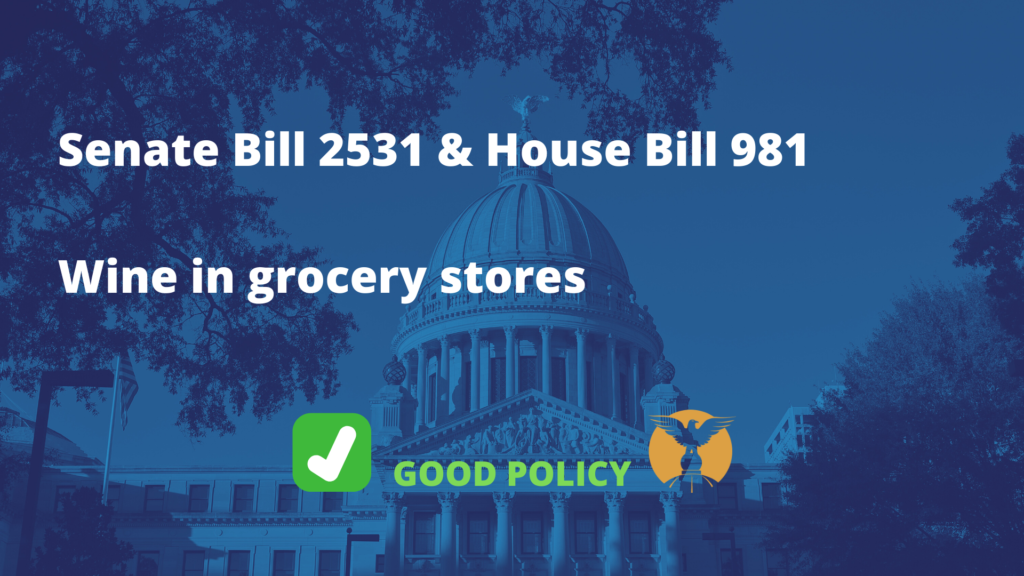
Mississippi is one of a number of states that ban the sale of wine and/ or liquor in grocery stores. In fact, only 20 states allow the sale of beer, wine, and liquor in grocery stores. A handful even ban the sale of beer.
These laws, like all prohibition laws, don’t stop people from consuming alcohol. They just require you to take an extra, unnecessary step. Coupled with the legalization of selling alcohol on Sunday, wine in grocery stores would bring convenience for many busy Mississippians.
These are anti-competitive policies that create a monopoly for liquor stores, not just limiting convenience, but limiting choice for consumers.
MCPP has reviewed this legislation and finds that it is aligned with our principles and therefore should be supported.
Track the status of this and all bills in our legislative tracker.
House Bill 951, sponsored by Rep. Dan Eubanks, would expand food freedom in Mississippi and allow for the sale of raw cow milk in the state.
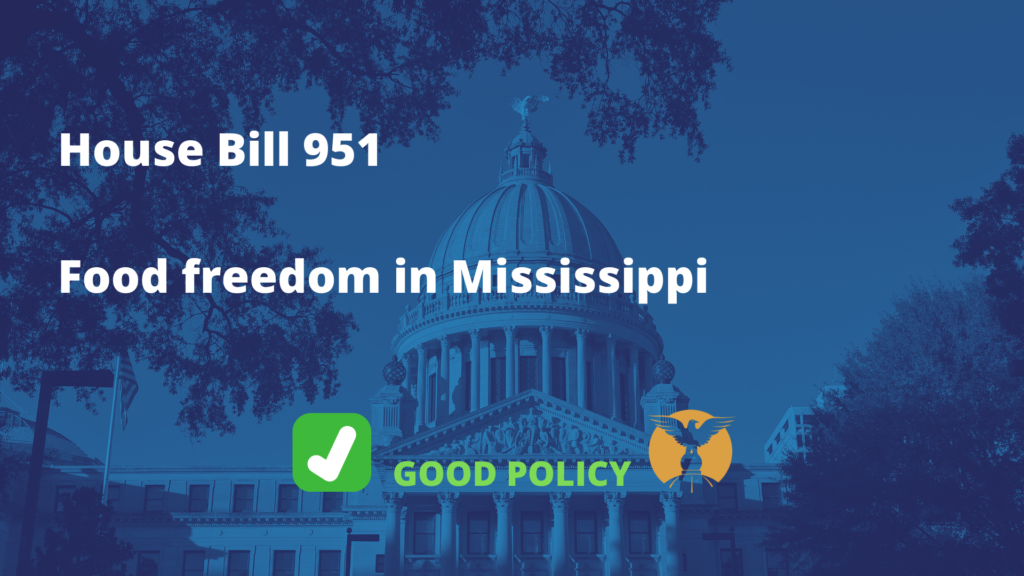
Mississippi currently allows the limited sale of raw goat milk, and that is under fire, while raw cow milk is prohibited. This would expand the sale of raw milk, and also allow for the sale of the milk at farmers’ markets, not just on the farm as the current law states.
The bill would also allow for intrastate sales of agricultural products directly from the producer to consumers and would prevent local governments from restricting those sales.
Mississippi currently has a limited cottage food law, that restricts what you can sell, how you can advertise, and how much you can make. Every state in the country, save for New Jersey, has such a law. Food freedom laws – which are on the books in Wyoming, North Dakota, and Maine – are essentially beefed up cottage food laws that allow for greater access to food for consumers and a new market for entrepreneurs.
MCPP has reviewed this legislation and finds that it is aligned with our principles and therefore should be supported.
Read HB 951.
Track the status of this bill and all bills in our legislative tracker.
House Bill 1068, sponsored by Rep. Dana Criswell, would require a criminal conviction for property to be forfeited to the state in the case of violations of the state’s Nongame and Endangered Species Conservation Act of 1974.
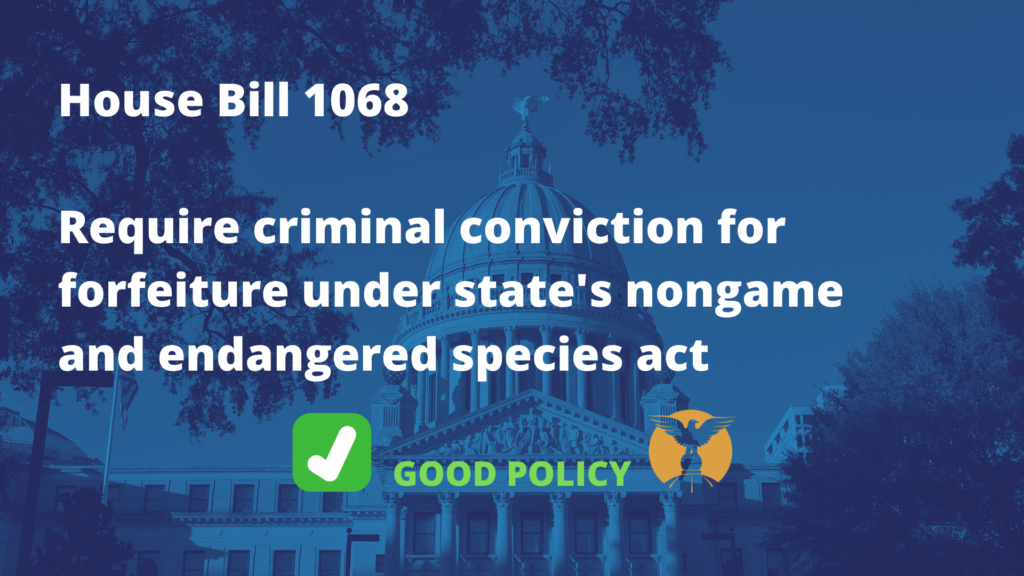
This law governs the management of endangered species, such as several species of sturgeon, black bears, gopher tortoises, indigo snakes and Mississippi sandhill cranes, among others.
The bill would also require that any proceeds from the sale of any forfeited property be put in the state’s Game and Fish Fund.
It would be the first change to the state’s civil asset forfeiture laws since the sunset of administrative forfeiture in 2018. Administrative forfeiture allowed law enforcement agencies to only have to go to civil court to earn title to seized property if the property owner filed a challenge.
Eighteen states require a criminal conviction (which requires proof beyond a reasonable doubt) to forfeit property to government. North Carolina, New Mexico, and Nebraska have abolished civil forfeiture entirely.
In Mississippi, a law enforcement agency can seize property without an arrest if they can convince a judge that there is probable cause to believe that the property has been used in the commission of a crime or is the product of crime.
The property then goes through a civil procedure with a lower standard of proof than those in criminal courts. If the property owner doesn’t file paperwork with the court to contest the forfeiture, the court almost always rules in favor of the seizing agency. Then the agency receives 80 percent of the proceeds with the prosecuting attorney, either a local district attorney or the Mississippi Bureau of Narcotics, receiving 20 percent.
Going to a system with only criminal forfeiture ensures that both individual and property have the same due process rights and puts the burden on the proof on prosecutors to prove that property is involved with a crime.
MCPP has reviewed this legislation and finds that it is aligned with our principles and therefore should be supported.
Read the bill here.
Track the status of this bill and all bills in our legislative tracker.
Three bills in the Mississippi legislature could allow wagers to be made on sporting events on mobile devices outside a casino property.
Right now, sports betting is only allowed in a licensed casino itself or with mobile devices on casino property.
If one of these three bills —House Bills 172, 941 and 959— became law, it would make Mississippi the sixth state to have full mobile betting. Right now, Mississippi is one of five states that allow partial mobile betting with some restrictions.
The three bills differ only in language and little else. All three bills would have the state collect a fee of six percent of the gross revenue received through the mobile gaming platform and eight percent of all other gross revenues. A mobile gambling app operator would also have to receive a license from the state.
HB 172 is sponsored by state Rep. Cedric Burnett (D-Tunica), who has also authored a bill that would allow casinos in Tunica to relocate inland to reduce their vulnerability.
HB 941 is authored by state Rep. Jeffery Harness (D-Fayette), who has also sponsored a bill that would authorize collegiate student athletes to receive compensation and have legal representation.
HB 959 is sponsored by state Rep. Jay McKnight (R-Gulfport).
Twenty states, plus the District of Columbia allow wagers on sports, with seven of those state legislatures have only recently authorized the practice.
Passage of one of these bills could give Mississippi a competitive advantage in the Southeast. Among Mississippi’s neighbors, Arkansas has legalized sports betting, but only at casinos and not on mobile devices. Louisiana and Alabama have no legalized sports gambling, while a bill to authorize the practice in Tennessee became law in May 2019.
Sports gambling has yet to start in the Volunteer State since regulations are only in draft form.
The Tennessee Education Lottery’s board of directors is scheduled to meet on Wednesday to possibly approve regulations, which would have a $750,000 licensing fee for operators and a 20 percent tax on adjusted gross income.
Tennessee will be an exception nationally since the new law only authorizes online betting since the state doesn’t have casinos.
The legislature approved permanent legislation in 2017 that not only set guidelines for the Gaming Commission to regulate daily fantasy sports, but also struck language from state law that prohibited betting on sports.
The federal ban on sports gaming — except in Nevada — was struck down by a 2017 U.S. Supreme Court decision, Murphy v. National Collegiate Athletic Association.
A bill in the Mississippi legislature would require sports teams at the state’s public schools, universities and community colleges to be designated only for one biological sex.
Senate Bill 2240 would require any public school, university or community college team to be either designated for those of one biological sex or the other (in addition to an exception for co-ed teams).
The legislation also has a clause that would allow any student who reports a violation of the law and is retaliated against by the school or other athletic association to have the right to injunctive relief and damages.
Another would allow a student whose bodily privacy was violated to have the same rights.
The bill is sponsored by state Sen. Angela Hill (R-Picayune).
While there haven’t been any cases of those born as males competing against girls in Mississippi, the issue has become a nationwide one as 17 states allow transgender high school athletes to compete without restrictions.
Three high school girls who run track in Connecticut filed a lawsuit Wednesday to challenge Connecticut’s policy of allowing male athletes to compete with girls in sports. They are represented by the Alliance Defending Freedom.
The three — Selina Soule, Alanna Smith, and Chelsea Mitchell — have been beaten consistently in track meets by a pair of transgender athletes born as males.
The lawsuit says the Connecticut Interscholastic Athletic Conference’s rules allowing transgender athletes to compete with girls poses a threat to Title IX because of physiological differences between men and women after puberty. Boys and men have more muscle mass and thus run faster and jump farther than girls and women.
Since 2017, two males have taken 15 women’s state championship titles in Connecticut. The U.S. Office for Civil Rights launched an investigation in August 2019 into Connecticut’s policy. The complaint was also filed by the Alliance Defending Freedom.
Title IX is a federal civil rights law that prohibits sex discrimination in educational institutions that receive federal funds. The law, which was passed in 1972, has led to a massive growth in the number of number of athletic opportunities for women. According to the NCAA, the number of female athletes in in 1982 was 74,239. By 2019, that number grew to 221,042, an increase of 197 percent.
Mississippi, Montana, South Carolina, Tennessee and West Virginia are the only states that have no policies toward male athletes competing against females.
A similar bill to SB 2240 stalled in committee in the Alabama legislature.
At least one college not far from Mississippi wants to make sure you think twice before sharing cards with a guy or girl you may have your eye on this Valentine’s Day.
Growing up, you may remember Valentine’s Day as a fun holiday in elementary school. Maybe you would pass out Valentine’s card to classmates, saving the best or biggest card for the person we had a crush on. Maybe that card even had a special note in it that only a 10 or 11-year-old could think up.
It was innocent fun on a day that meant lots of pink or red hearts and chocolate to go along with it. Eventually, perhaps, Valentine’s Day became more serious.
But not at the University of New Orleans. It has been awarded the “speech code of the month” violator by the Foundation for Rights in Education (FIRE) for February. This public university has a speech code so vague that an unexpected Valentine could be considered sexual harassment.
One can wonder if a secret admirer might quickly be deemed a stalker by campus code.
UNO’s ambiguous speech code cites examples of harassment as “visual displays such as leering” and “displays of sexually suggestive objects” such as cartoons. The College Fix suggests that icky handshakes and some of The Simpson’s cartoons might meet this criteria.
A Valentine should only constitute harassment if it is part of a “pattern of conduct,” FIRE asserts. If the campus regulations are not clear for students, they will be forced to interpret the fuzzy rules as literally as possible.
In that case, it is safer not to pass out little love notes or cards with puns this Thursday.
This free speech issue at UNO is part of a pattern itself—a pattern of little respect for First Amendment rights. Not only have campus rules and the collective left possibly banned hearts day; they’re on their way to ban every traditionally American holiday.
Halloween? Costumes are offensive. 4thof July? America is a constant disappointment. Easter and Christmas? Get your patriarchal religion off their quad. Thanksgiving or Columbus Day? Imperialistic. Super Bowl Sunday? Don’t even think about it.
This upcoming holiday, Harvard students will be given 100 characters to specify their gender on an online campus dating program. This option became available following a student protest and a public apology from The Harvard Computer Society for originally creating a gender binary program. And conservatives are hostile to science?
To be clear, speech on college campuses is allowed as long as campus ideology agrees.
Free speech seems to be a reward on campus only for those who meet the ideological bandwagon standard in academia. That is not the way it should be. While the war on Valentine’s Day cards allows us to poke fun at the often-goofy campus speech codes, they are no laughing matter.
Free speech should not only be tolerated, it should be encouraged on college campuses. First Amendment rights cannot be limited to just a remote area deemed acceptable by administration far from any students. Stimulating curiosity and intellectual debate has long been a hallmark of American college campuses. Unfortunately, that is no longer the case on too many campuses.
That is why every state in the country needs legislation protecting free speech for college students. Because relying on college administrations is not working.

